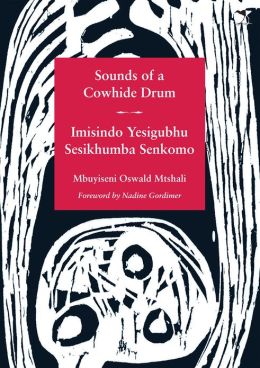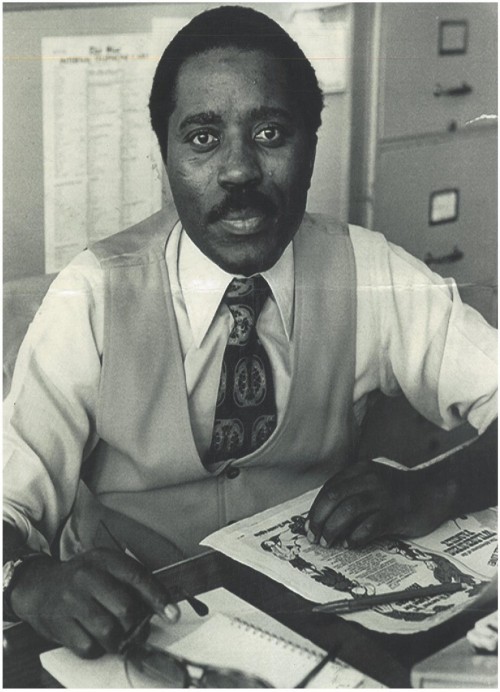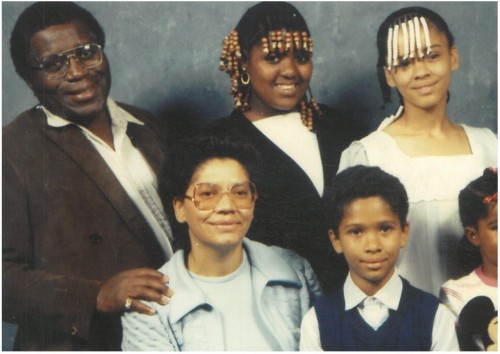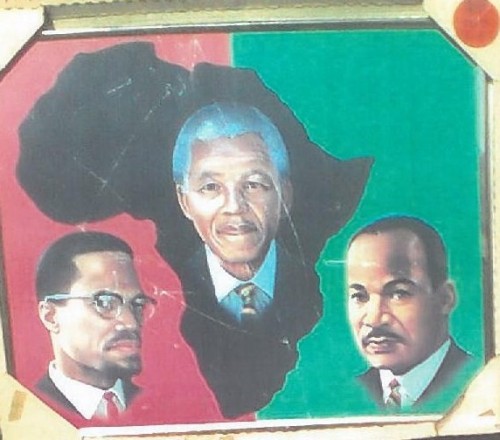Sounds of a Cowhide Drum // An Interview with Mbuyiseni Oswald Mtshali
***
Look upon me as a pullet crawling
from an eggshell
laid by a Zulu hen,
ready to fly in spirit
to all lands on earth.
A few months ago I posted up some thoughts on Mbuyiseni Oswald Mtshali’s wonderful book “Sounds of a Cowhide Drum” in which I indicated an interview with Mr. Mtshali would be forthcoming. And, well, it took a while longer than I’d wished but here it is:
***
Rauan: When we chatted you mentioned that the first poems you wrote were love poems, that you were writing to “impress girls”—-and besides the dark and serious subjects and moods of Sounds of a Cowhide Drum there is also a joie de vivre to it, a real sensuality.
I want to be adorned
by the silken suit so scintillating in sheen;
it pales even the peacock’s plumage,
and catches the enchanted eye
of a harlot hiding in the alley:
“Come my moulten bird,
I will not charge you a price!”(from “The moulting country bird”)
And, so, can you talk a bit about the poet as peacock? as shiny bird?
Oswald: A peacock is considered to be the proudest and most colorful bird in the animal kingdom. In the poem “The moulting country bird” the bird symbolizes a transformation of a country boy from the village of KwaBhanya on banks of Blood River in Northern KwaZulu to the bright neon lights of Johannesburg, the Golden City. The bumpkin sheds his garish and comical garments of country life and assumes the mantle of sophistication and “civilization” in a cosmopolitan metropolis of EGoli.
Once he has embraced the city slickers’ fashionable attire he goes back during his village to show off and strut his stuff like a peacock to the envy of his coevals and contemporaries who are still clad in their shabby garments of most clodhoppers in the country. His mannerisms and speech patterns are dramatically changed and he follows the trends of city life and discards all those things that define and remind him of his “backward” people, especially those of his same age group. The whole process is marked by migration from rural areas and transformation by life in the urban areas where he falls under the spell of many influences. His experiences and interactions with a polyphonic of cultures and Babel of languages, races, colors, ethnicities, creeds have an everlasting effect and unforgettable impression on his whole perception of the world and its people.
RK: You mentioned that the nuns at your school educated you not only in faith but also in great, classic British literature. Some of the examples you gave were Wordsworth, Keats, Shakespeare, and you mentioned also about how much fun it was when the class performed a play adaption of Longfellow’s “King Robert of Sicily.” Can you tell us a bit more about your early experiences with literature and how they helped to prepare the fledgling poet?
MOM: By the time I was three years old my parents had taught me and my siblings the basic structures and formation of words from colorful “word blocks.” This prepared me for literature that was taught by German nuns of Bhanya primary and iNkamana high schools which had an everlasting effect on me. Beginning from the elementary readings to mention a few such as “ The Hardy Boys” to “The Haunted House on the Hill” “Far from the madding crowd” “ Kidnapped” and for me the most powerful of them all “ Oliver Twist” and “Great Expectations” opened new vistas for a boy from KwaBhanya on the Banks of Blood River.
From these missionaries I learned that literature like all art forms was a “window” into a hidden world and a “mirror” of life in society. Initiation into poetry started with limericks like “Jack and Jill went up the hill” “Twinkle, Twinkle Little Star, How I wonder how you are” that thrilled me immensely as it brought up the enchanting sounds of words and their mesmerizing echoes on my Zulu ears. I was instantly and eternally hooked on poetry that I was inspired enough to pen down “ You’re so near and yet so far, Have no fear my love, Be my ever shining star from above!” I handed my first and tentative venture into love poetry at the tender age of thirteen to a devout Catholic girl named Beatrice Pike. She handed it to the horrified nuns and I paid dearly for it. I became the most demonized and caned boy in the whole boarding school. I had tried to seduce a prospective nun with a devil’s inspired “rubbish” and I deserved eternal hellfire and perdition. By this time it was great joy to immerse and study in detail the different forms of poetry from the romantic, to metaphysical, to pastoral to lyrical to Shakespearean sonnets and the lamentable Grey’s Elegy to John Keats’ odes. All these different “schools” of poetry were like a diamond with each facet of color depicting various spheres of life and human endeavor.
To reinforce my passion for poetry I was also immersed at that tender age to isiZulu poetry of Dr Wallet Benedict Vilakazi and Professor J.Mandlenkosi Sikakana both of them eminent poets and academics whose works, amongst the finest ever written in any African language, were published by the University of Witwatersrand in Johannesburg. Not only did this boost my love for poetry but also inculcated a deep sense of pride for my mother tongue of isiZulu and its great importance in asserting isiZulu into the canon of academia at home and abroad. The works of these two scholars, who are now deceased, highlighted the importance of preserving isiZulu as a vital language that has a crucial role to play in the discourse of life in South African society and the world at large.
RK: You grew up in the Apartheid system and even though your poems do a very good job of conveying how people of color suffered within an extremely oppressive and negative system they are not dominated and/or spoiled by bitterness and anger or melodrama. The voice of the poems understands the oppressor and it understands the black gangsters who took advantage of and exploited their own people in such a difficult time. Can you talk a bit about how you were not consumed by frustration, anger, hate? because of the way you were brought up? your natural personality (big-hearted)? or some sort of combination?
MOM: Apartheid was predicated upon the falsehoods of racial supremacy of a white minority. As an ideology it seems to have been designed by demented and deranged minds that were completely alienated from reality. How could a tiny white minority hold in bondage for perpetuity a big belligerent and bellicose black majority? The whole façade was doomed to failure because the architects of the system that was a conundrum from the onset could not be sustained with any logical rationality. It had to be maintained with brute force of oppression and exploitation; and where these two factors exist there is always resistance in the course for freedom.
From the onset my parents understood this untenable situation that existed in our country and society. They prepared us on how to deal with the fight for daily survival in which the color of one’s skin was a determinant factor. As teachers they had gone through a lot of difficulties and encountered a plethora of challenges and problems themselves to receive the good education they got from missionaries. They instilled in all six of us children the importance of education that begins from a tender age at home and goes on outside in the community, church and, social and political organizations. We all grew up knowing that we belonged into this church denomination and that political party yet we were all part and parcel of a black nation that was free of narrow exclusive and divisive tribal affiliations. KwaBhanya was called a “village of four cities” because it had clusters of huts and shacks with colorful names of Sodom and Gomorrah, Nazareth and Antioch.
Adherents and residents of these places lived as hedonists as well as holy rollers and got on very well without any faction any sectarian violence. Of course all of them were black and live according to their own code of conduct and values. Some of them lived according the code of survival of the slyest and spent their lives in and out of jail. Most of them were law abiding citizens who lived according to the bible.
RK: Poetry changed your life in many way: for example, the publication of Sounds of a Cowhide Drum and its subsequent success resulted in your going to Iowa in a Foreign Writers program. Can you tell us a bit about your experiences at Iowa? and what was most valuable about your time spent there? (note: Oswald Mtshali, later on, lived in the U.S. for many years before returning to Soweto where he now resides)
MOM: For me coming from this environment and the repressive conditions under which I grew up, poetry was a gateway to “success.” It provided a way out of morass of misery under a very ruthless system that was designed to destroy all those who opposed it. Without indulging in a sob song of self pity, my whole life was changed by the publication of my slim book of poems “Sounds of a cowhide drum” in 1971. This book was published in 1971 by a dear friend and a wonderful human being Lionel Abrahams who was Jewish and its striking cover was done by Wopko Jensma, nonconformist Afrikaner and its wonderful Foreword was by Nadine Gordimer, a great comrade-in-letters. Producing such a collective was not only unique in South African literature but also set the tone for cooperation across the color line a strictly segregated society that was South Africa at that time.
Its success might not have brought me a financial bonanza but it generated a bountiful of goodwill among the hundreds of South Africans of all colors, races, creeds and ethnicities who saw it as a breakthrough in breaking down the rigid walls of racism. Not only did the success of the book have an impact in South Africa but also it was well received in other parts of the world. It opened new vistas for me. For instance, my first venture into the US was the invitation to the International Writers’ Program founded by a great America, Paul Engle at the University of Iowa, Iowa City in the United States was the crowning glory for the boy from KwaBhanya via Orlando Shelters, via White City Jabavu in Soweto. To be honored with an award and have certificate of “Honorary Iowan” bestowed upon me by Governor Ray was a beyond my wildest dreams. I was the first and only black South African to be given such recognition and acclaim by an institution that is widely renowned all over the literary world.
RK: Some people glamorized the fact that you were a “messenger boy” (see my previous write up for more on the use of “boy” in apartheid era South Africa) living in Soweto but working in Johannesburg. But at the same time you were writing poems by day and by night. Carrying a journal with you on the trains and jotting down notes whenever you could. Johannesburg, for all its evils, was helpful for you in your becoming a better and better poet. I’m referring to your meeting and working with Lionel Abrahams and also Dorkay House which you said was a place Black writers, musicians and intellectuals could go to for nourishment and to mix with whites on a kind of level playing ground? can you tell us more about good and evil Johannesburg?
MOM: I consider myself still to be a “messenger boy” at heart. I did that job for a living earning meager wages. Now as a poet I consider myself a world messenger and one of my greatest friends the late academic and finest mathematician, Dr Thamsanqa Wilkinson Kambule invited me in 1973 to his school Orlando High to read poetry to his students and he introduced me as a “P.E.P.” – Poetic Emissary of the People. That is the finest accolade ever paid on me by anyone and I have cherished it since then. I have traveled to many parts of the world and left my footprints on ALL the five continents of this planet earth.
Would I have achieved that without poetry? Never! Lionel Abrahams gave me a lifeline that rescued me from crime, alcoholism, poverty, disease, violence and many other social ills that I saw and still see destroying many people around me. Close relatives and friends have perished in front of my own eyes and I consider myself to be blessed and lucky to be still alive. One of my refuges where I sought help for my survival was at Dorkay House downtown in lower Eloff Street. This a haven for many black and white artists where the could meet and share a few moments in pursuit of their creative arts such as music, drama, dance, poetry, painting and sculpture. The musical King Kong was conceived and launched from there before it hit overseas theaters. Athol Fugard and Barney Simon were the producers and creators great works which they launched from this hive of creativity. For me it offered a haven of peace where I went to find a quiet corner to pen down a few lines of verse and also interact with other writers. Barney Simon, Wally Serote, Stanley Motjwadi and I collaborated in writing a musical Phiri a musical adaptation of Ben Jonson’s Volpone. Together with musician and composer Mackay Davashe and singer and actor Sophie Mgcina we had almost completed the play when forces beyond our control put a stop to the work. That was my darkest hour of disappointment of my creative efforts as a playwright but here I am still alive and surviving.
This incident inspired me to write and complete a three act play HANG JOHN MAKINITHA on the death penalty as it was applied during apartheid. Capital punishment has been abolished in South Africa but one of the most implacable foes of this cruel form of legalized murder was Professor Barend Van Niekerk, Dean of the Law School at Rand Afrikaans University RAU. An Afrikaner from the elite group of his community he was hounded to death for trying to save the 18 year old black youth who together with a white accomplice had murdered a white businessman in a daylight robbery in the heart of Johannesburg. The script was edited by Nadine Gordimer and it is ready for production on stage or as a movie. From that setback of the closing down of Barney Simon’s PHIRI emerged Hang John Makinitha.
RK: How do you feel about where South Africa is now ? and where do you think she is headed?
MOM: As for present day South Africa, I remain an optimist and a realist. I am Oswald the Optimist who sees without any tinted glasses the fate of a nation rising from the apartheid cauldron of hate and bloodshed through a forward trajectory of democracy to a bright future for most citizens and all people of goodwill across the color line. I came back to my country after a long stay in America to be a full participant not an idle spectator rocking his backside on a chair of indolence. In my own way I am quietIy making literary contributions to the upliftment of my community, society and the country as a whole in several fields of human endeavors especially in the creative arts and language development and appreciation. I have completed Nadine Gordimer’s short story “Children” which I have translated into isiZulu Abantwana I hope this work will be incorporated into high school or even college curricula to be taught jointly in English and isiZulu.
RK: the new Jacana Media edition of Sounds of a Cowhide Drum contains, in addition to the original english poems, you versions of them in isiZulu. but you expressed concerns to me about the future of language like Xhosa, isiZulu, Sotho, etc. This was a bit of a surprise to me, at first, when you mentioned it (because i’d been asking you about Afrikaans which is an isolated language as part of an isolated culture– how ironic and strange then that Black languages find themselves in a similar boat: ie, that they are in danger of losing more and more young people who want and need English for business, schooling, Facebook, Twitter, etc). Your thoughts?
MOM: Your previous question overlaps into this one on language. I regard language as a living organism and a specimen for study like a biologist dissection an amoeba under a microscope looking and defining the nucleus and the overlapping layers of protoplasm and ectoplasm that surround it to form a living cell. Therefore the survival of language depends of the constant nurturing with love and care by its users to keep it alive. They are responsible to make sure it is saved from extinction and keep safe from the vagaries of abuse and misuse to secure its vibrancy and power in all forms of communication from speech/oral tradition to the written word in various spheres of human interaction. Despite the challenges from the social media my language of isiZulu my beloved mother tongue was there before Facebook and Twitter were conceived and born. It will be there in poetry, song, story and play where the new upstarts of mass media and communication cannot and will never reach. As long as I live isiZulu will survive and it will carry on into posterity by coming generations.
RK: I understand that you are currently hard at work on a new book, an epic poem of several hundred pages (as you described it to me): a book about Nelson Mandela, Martin Luther King and Malcom X entitled “The Black Trinity.” What more can you tell me about this book? (content, anticipated release date, etc)
MOM: After close to a decade I have finished an epic poem THE BLACK TRINITY of Nelson Mandela, Malcolm X and Martin Luther King Jr which I started writing in New York City after Mandela’s first visit to America following his release in 1990. The poem is inspired by a portrait the three heroes which was painted by a drug user who was dying of HIV-Aids in the streets of the city. I bought it for a song and brought it back with me to Soweto and hung it in my humble home where it has served as a daily inspiration for the completion of the six hundred page poem/praise song. It is the first of its kind and I hope not the last to written in both English and isiZulu. Africa has over 6000 recorded languages and most of them are spoken in heavily densely populated countries which has a multiple plethora of languages many of them in danger of disappearing from the face of the earth. But the publication of the Black Trinity will immortalize isiZulu and elevate it to the canons of linguistic excellence.
RK: do you think people are naturally good or evil ?
MOM: With reference to good and evil, I can only aver that no human being is born evil. We are all creatures of God Almighty and created in his image. I do not subscribe to the Charles Darwin’s Theory of the Evolution of species. I am not a descendant of an baboon or ape because Noam Chomsky empirically in his experiments and tests proved that only human brain has a language acquisition device –LAD which not other creature.
That language device is where the immortal human soul is located. Experiments conducted by this linguist scientist proved beyond any doubt that the acquisition and usage of language is a common denominator that connects us all as humans. Nothing is more vital than that as a hallmark of our humanity. Other differences based race, color, creed, ethnicity are extraneous encumbrance in our struggle for survival on this planet.
That is why evil exists in all society even in the so-called civilized world where prisons are full of murderers, rapists, robbers and other types of criminals. On a personal basis I can point out that like most humans, we are all shaped positively and negatively by our environment and other factors and conditions. More than perhaps than other people I have had my own share of near-death experiences. I bear knife scars from the streets of Soweto and an apartheid bullet that went through my body. I have survived it all through the grace of what I call a force of Divine Intelligence and Providence. DIP one can only explore and fathom this power through self and group hypnosis which I have studied and practice. Combined with Buddhist chanting one can stave of and purge many forms of evils that are bent on destroying us as individuals, groups in society and human beings wherever they are will rise above their own adversities and emerge triumphant. All we have to do jointly is to apply mind over matter. Let righteousness thrive over evil. With the help of all art forms from poetry to painting we shall paint and sing for a better world. We shall create a new universe and a fresh earth. Rulers of this new cosmos shall be poets because as one sage so beautifully put it “poets are the legislators of the world.”
RK: What do you think of J.M. Coetzee’s work? has it been good for other South African writers?
MOM: I am not a critic of other people’s works. Neither do I have any expertise in passing judgment on a writer like JM Coetzee. I know Nadine Gordimer’s marvelous writings and their prescient relevance to past and present South African society. She might look frail at 90. But she still bubbles with a dynamic personality, sharp intellect, profound humanness that has captivated me since I first met her more than forty years. I was honored when she graciously agreed to write an insightful foreword for my anthology of poetry Sounds of a cowhide drum in 1971.
Our mutual respect and love for literature has culminated in a forthcoming translation of one of her finest short stories Children which I have translated into isiZulu with a title of abaNtwana. I am preparing to submit for publication as a Reader for high schools and colleges. Its relevant theme in present day South Africa can only prove fortuitous for a society which has the dubious distinction of the highest murder rape and murder of children in the whole world. For me that is committed writing in which she has used her enormous talent to champion the cause of freedom and fight for the underdog in our country.
Dr Mbuyiseni Oswald Mtshali
Soweto, 2014
Tags: Mbuyiseni Oswald Mtshali





Yes. US Mexico border is a form of apartheid. All borders ?
[…] Source: HTML Giant […]